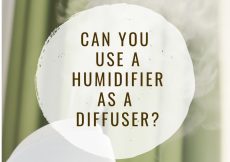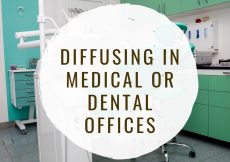This post may contain affiliate links. If you make a purchase, I may earn a commission. As an Amazon Associate, I may earn from qualifying purchases.
You may have seen claims that nebulizing diffusers are the most therapeutic diffusers out there and been confused. What does that mean? Are ultrasonics not therapeutic? The short answer is both are therapeutic. Let’s explore the differences to help you decide which is best for you.
What’s the difference?
Ultrasonics have a water reservoir and use ultrasonic vibrations to create a mist from the water and essential oil mixture. Most diffusers call for 5 drops of essential oils in about 150-200 ml of water.
Nebulizing diffusers have a reservoir to which undiluted essential oils are added. They use an air pump to atomize the oils into a fine mist.
The main differences:
Oil usage—One big difference between the two types of diffusers is oil usage. The ultrasonics use very few essential oils, just a few drops a day. Nebulizers can blow through 10 drops of oil in less than an hour.
Noise—Nebulizers have a long reputation of being a bit noisy. The best comparison is to an aquarium pump. It is a low hum that tends to sound louder at higher output levels. (Often it is not actually louder, but the pump is working faster and that increased frequency sounds louder). One company that has worked to solve this problem is Diffuser World (affiliate link). Their flagship Aroma Ace has an optional silencer.
Ultrasonics are usually very quiet. This is most likely because ultrasonics tend to work in a frequency above the range of human hearing. Most ultrasonics I have used have just a slight gurgling noise.
Cost—No doubt, ultrasonics are significantly cheaper than nebulizers. The more expensive ultrasonics are about as costly as the least expensive nebulizer.
Materials—While most ultrasonic diffusers use BPA free plastic, very few have no plastic at all. Nebulizers may have an exterior made of plastic, glass, wood, or ceramic, but the reservoir that holds the oils is almost universally glass.
There’s a good reason for this. Essential oils and plastic don’t get along very well—the oils will break down the plastic over time. In an ultrasonic the essential oils are diluted enough in water that this isn’t a concern.
In nebulizers, which use undiluted oils, a plastic reservoir would be a problem. If you don’t want your oils touching plastic, a nebulizer is one of your best bets.
Diffusion Time—The recommended maximum length of time to run an ultrasonic diffuser is 30-60 minutes, one to three times per day. The maximum length to run a nebulizer is 10 minutes, one to three times a day.
The reason for this difference is of course the concentration of the oils being released. While both methods of diffusion are pretty safe, (since the oils get diluted in the whole volume of room air), the mist from a nebulizer will be more concentrated and release more oils in a given time than an ultrasonic.
It’s a classic relationship between concentration and time—higher concentration needs less time, lower concentration needs more time for a similar dose. In other words, if you put 5 drops of essential oil in your ultrasonic, it may take 5 hours for the tank to run dry and use up the oil/water combination. With a nebulizer, you can diffuse a drop in about 10 minutes (depending on the output setting you are using of course).
Humidity—A minor difference is that ultrasonics will add some additional moisture to your air, while a nebulizer will not.
Read more: Can an Ultrasonic Really Double as a Humidifier?
Therapeutics:
Both ultrasonics and nebulizers are therapeutic. It doesn’t take a lot of essential oil to have a positive effect on our bodies. If you are mostly diffusing on a daily basis for fragrance, relaxation, concentration, or overall health benefits, an ultrasonic is all you need.
Nebulizers will emit a more concentrated mist, so when you have an active complaint like an illness, a nebulizer may be more effective. This is where we get the idea that a nebulizer is more therapeutic—its mist is more concentrated.
Which is Best for You?
Ultrasonics are best for:
- When you are on a budget
- For everyday usage
- To save money on essential oils
- You have young children, an elderly person, or pets in your home for which a strong concentration may not be suitable
Nebulizers are best for:
- If you have specific acute complaints (e.g. illness, recurrent headaches or respiratory issues) from time to time and want a more concentrated dose of oils
- You don’t mind using extra oils to address your complaints
- You don’t want your essential oils to contact plastic
Read more about Ultrasonics and Nebulizers
What do I do?
I have both. I use my ultrasonic(s) for everyday diffusion. When someone in my family complains about starting to feel a little achy or has a sore throat, or even if we were exposed to someone with an illness, I break out the nebulizer for a day or two. I find we use it a few times a month during the school year, and not as much during the summers.



